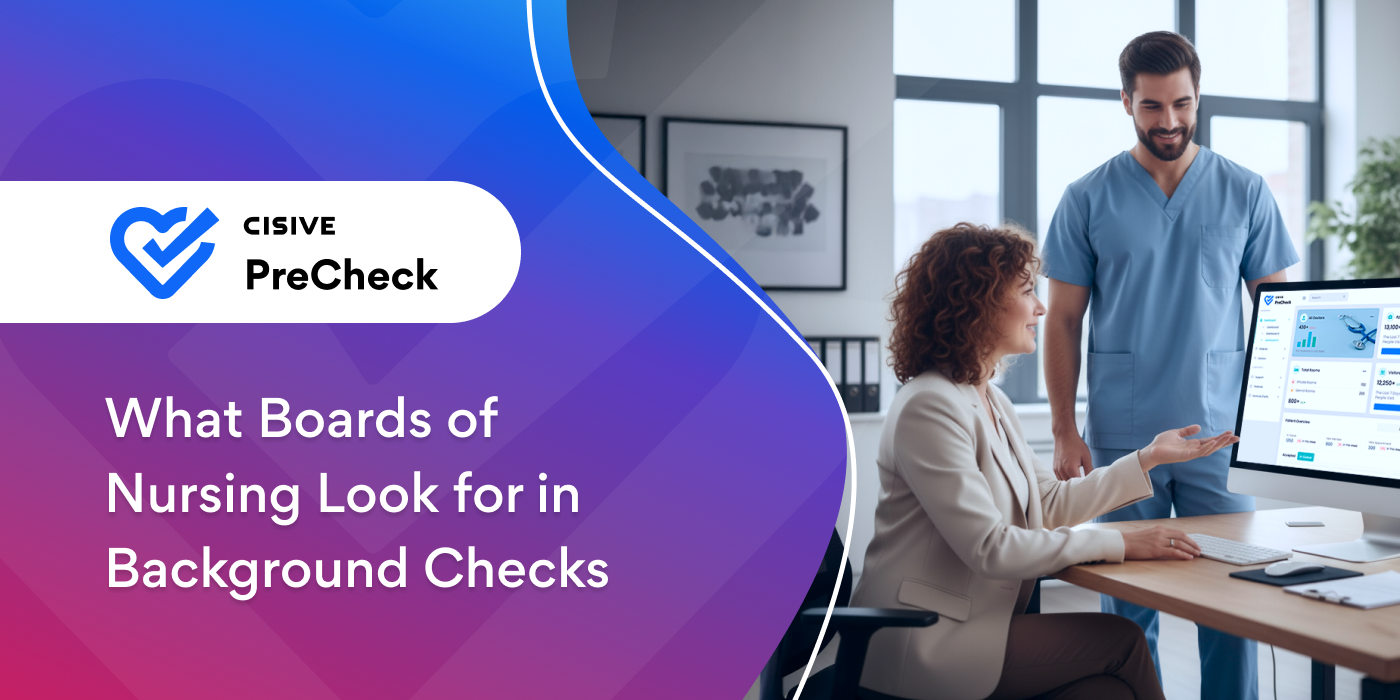

Most healthcare employers rely on a rigorous background check program in order to safeguard their...

If your organization hires nurses, you already know the stakes: One overlooked license issue or unreported disciplinary action can put patients at risk, trigger compliance violations, and damage your organization's reputation. Yet even with state boards mandating background checks for licensure, gaps still occur, often because employers assume the board of nursing (BON) has done all the vetting for them.
The truth is, background checks for nursing aren't one-size-fits-all. They vary by state, and without a clear understanding of those differences, even well-intentioned employers can end up noncompliant. The result? Delayed hires, regulatory penalties, or exposure to preventable patient harm.
That's why it's critical to take a proactive approach. Understanding what boards of nursing look for, how requirements differ across jurisdictions, and how to integrate them into a consistent and defensible screening strategy can help you protect your workforce and your patients.
Key TakeawaysHere are the key things you need to know about Boards of Nursing and Background Checks:
|
Boards of Nursing require criminal background checks as part of the licensing process to confirm that applicants for registered nursing licenses meet legal, ethical, and professional standards. As part of the licensing application, candidates might have to submit fingerprints for state and federal criminal history checks. These checks verify a candidate's identity, education, and license eligibility while screening for past criminal convictions, fraud, or disciplinary actions that could compromise patient safety. This process can also begin during nursing education programs via student background checks, which verify information before clinical placement.
Every U.S. state conducts some form of criminal background check for licensure, but the scope and criteria vary. Employers must ensure they understand how different state screenings affect hiring timelines, compliance obligations, and risk management.
Yes. While every state requires background screening for nursing licensure, the methods and standards differ. Some states automatically disqualify candidates for certain convictions, such as abuse or drug diversion, while others evaluate each case individually. States like California and New York rely on rehabilitation assessments and the severity of the offense before deciding on licensure.
The Nurse Licensure Compact also factors into compliance, as a nurse licensed in one state may practice in another without undergoing a separate background check. These inconsistencies mean employers hiring across multiple states must confirm that their verification processes align with each jurisdiction's requirements.

State boards of nursing generally require applicants to undergo criminal background checks that include core elements, each intended to confirm a nurse's qualifications and ensure patient safety. These components help state boards verify that candidates meet legal and ethical requirements for licensure.
Identity verification: Confirms personal identifiers such as name, birth date, and Social Security number.
Education and employment verification: Ensures degrees, training, and prior experience are accurate.
License checks: Validates active and initial licensure and identifies any disciplinary actions.
Criminal history record review: Searches state and federal databases for misdemeanors, felonies, or pending cases through fingerprint-based FBI and state checks.
SanctionCheck: Detects healthcare-related sanctions, exclusions or disqualifications across federal and state agencies.
Drug and immunization verification: Confirms readiness to perform in clinical environments safely.
Together, these elements provide a clear, defensible record of a nurse's qualifications and integrity. Healthcare employers must understand what goes into state board screening requirements and where they may fall short if they want to maintain compliance and protect patient safety.
The criminal background check process begins once an applicant submits fingerprint cards and consents to a review during the licensing application. The state board uses that data to run searches across criminal databases, education and employment records, and professional licensing systems. If a concern or discrepancy arises, the board conducts a case review before issuing or renewing a license.
For employers, these state board checks confirm that a nurse is legally eligible to practice, but they don't replace employer-level screenings, which verify ongoing compliance, disciplinary updates, or exclusion monitoring.

For healthcare employers, hiring isn't just about filling roles. It's about protecting patients, maintaining compliance, and safeguarding the organization's reputation. As nursing shortages grow and multi-state hiring expands, the risk of overlooking a disqualifying offense or lapsed license increases. Comprehensive nursing background checks help healthcare organizations identify these risks early, reducing liability and ensuring every nurse who provides care meets the highest standards of integrity and professionalism.
A single compliance lapse can carry significant financial and legal consequences. Thorough background checks protect employers against negligent hiring claims, regulatory fines, and civil penalties tied to unverified or improperly licensed nurses. These checks help employers meet Medicare and Medicaid participation requirements, which mandate that no excluded or sanctioned individuals be employed in patient care roles. By maintaining a defensible screening process, employers can demonstrate due diligence, a critical safeguard in today's complex regulatory environment.
In healthcare, patient safety depends on trust. Background checks serve as a frontline defense against hiring individuals with histories of abuse, substance misuse, or unsafe care practices. Recent research published in the Journal of Professional Nursing shows that roughly 3.4% of nursing background checks identify reportable findings, with most linked to substance-related offenses. Detecting such issues before hire helps organizations prevent harm, maintain quality of care, and strengthen public confidence in their clinical staff.
A single incident involving an unvetted or unlicensed nurse can undermine trust and invite scrutiny from regulators, patients, and the media. Comprehensive background checks prevent these situations by confirming that every nurse representing the organization is qualified and compliant. This diligence also reinforces an employer's reputation as a safe, ethical, and patient-focused institution, an increasingly valuable differentiator in a competitive healthcare labor market.
Even when your organization meets every state licensing board's requirement, gaps can still appear without a structured approach. These tips help employers move beyond the basics, creating a screening process that's not only compliant but also defensible, consistent, and efficient.
Each state has its own nursing license screening requirements, and knowing those details is essential for avoiding compliance pitfalls. Employers hiring across multiple states must confirm what level of criminal review, fingerprint-based background check, and documentation is required for each jurisdiction.
Review state BON regulations annually to track changes in disqualifying offenses or renewal criteria.
Document verification procedures for every applicable state to ensure consistency across hiring teams.
Train HR and compliance staff to recognize differences in compact-state versus single-state license checks.
Keeping current on these requirements prevents delays, protects against legal risk, and ensures nurses are cleared to work where they're needed most.
A nurse's license status can change overnight. Real-time monitoring tools allow employers to receive immediate alerts if a license lapses, expires, or becomes encumbered. These systems integrate with primary source verification databases to catch disciplinary actions or exclusions before they affect patient care. Regular automated checks strengthen compliance and reduce the manual workload on HR teams.
While state board checks confirm a nurse's eligibility for licensure, they don't always reveal the full picture. Boards of nursing focus on licensing criteria, not employer-level risk factors or ongoing compliance.
Relying solely on state-level checks could expose your organization to compliance or safety risks. Instead, supplement state board screening requirements by:
Adding sanction screening to uncover sanctions or exclusions beyond the state board's data.
Including national criminal searches and automated employment verification for a more comprehensive view.
Implementing post-hire monitoring to catch new disciplinary actions or offenses in real time.
Maintain fairness and consistency by knowing which offenses automatically disqualify a candidate and which can be reviewed. For instance, violent crimes or patient abuse usually warrant automatic disqualification, while older, nonviolent offenses might not. Employers should align internal policies with state guidelines to ensure compliance and equity in hiring decisions.
Detailed recordkeeping is your best defense against compliance disputes. Track every screening step, from consent forms and verification logs to decision notes. This creates a clear audit trail and demonstrates due diligence in the event of an audit or legal challenge.
Consistency ensures fairness and protects against regulatory exposure. Standardizing processes across facilities prevents site-specific discrepancies in how background checks are conducted and evaluated. For example:
Establish written policies that apply equally to all nursing candidates.
Use a centralized platform to manage and store screening data securely.
Schedule regular compliance audits to confirm adherence to federal and state standards.
By creating a repeatable, transparent process, employers reinforce compliance while building a culture of accountability and trust.
Compliance doesn't end once a nurse is onboarded. Continuous license and sanction monitoring helps employers detect disciplinary changes or exclusions that may arise after hire. Ongoing reviews ensure nurses remain qualified and in compliance throughout their employment, protecting patients and preserving your organization's integrity.
Background checks shouldn't slow down hiring, especially when patient care depends on having qualified nurses ready to work. That's where partnering with an experienced healthcare screening provider makes the difference.
Cisive PreCheck specializes in helping healthcare employers unify their background check, license verification, and post-hire monitoring processes across every state and facility.
By integrating real-time license monitoring, primary source verification, and continuous sanction screening, PreCheck helps healthcare organizations reduce manual work and prevent delays that stretch out time to hire. More importantly, PreCheck's technology and healthcare-specific expertise ensure that compliance isn't compromised by haste or inaccuracy. The result is a screening program built for today's regulatory complexity and tomorrow's workforce demands.
Hiring qualified, compliant nurses isn't just about meeting state requirements. It's about protecting patients, preserving trust, and maintaining operational continuity. With the right screening strategy, employers can achieve all three. By combining comprehensive background checks with continuous monitoring and centralized compliance management, PreCheck empowers healthcare organizations to make safer, faster, and more confident hiring decisions.
Ready to strengthen your nurse screening process? Talk to a PreCheck expert to see how we can help you improve compliance, reduce risk, and hire with confidence. Speak with an Expert →
Author: Chris Bolla
Bio: Healthcare Screening Specialist at Cisive PreCheck. Husband, Dad, Coach, Hack Landscaper.
Let's Connect on LinkedIn
Most healthcare employers rely on a rigorous background check program in order to safeguard their...

Registered nurses, licensed practical nurses, and nurse practitioners play an important role in the...

Every hospital wants only qualified, verified providers delivering patient care, which makes the...